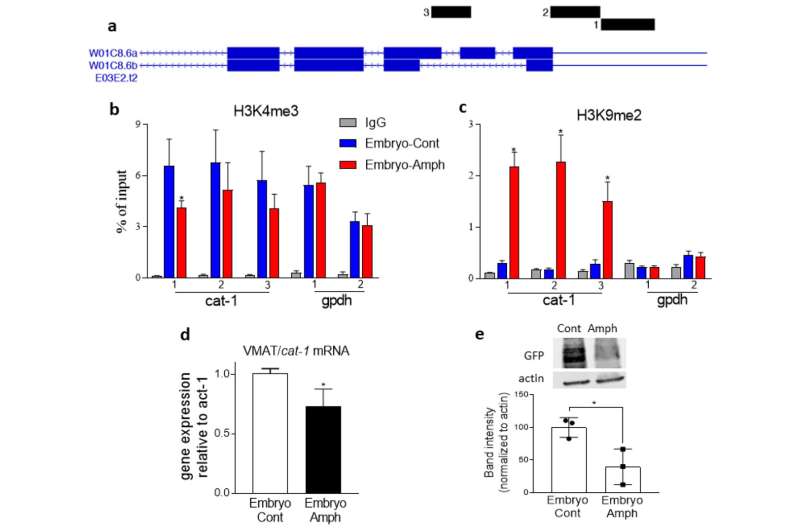This article has been reviewed according to Science X's editorial process and policies. Editors have highlighted the following attributes while ensuring the content's credibility:
fact-checked
peer-reviewed publication
trusted source
proofread

Amphetamine is a psychostimulant that has been used to treat a variety of brain dysfunctions. However, it is a highly abused drug. In fact, amphetamine and amphetamine-derived compounds such as methamphetamine (Meth) are among the most abused psychostimulants in the world.
The neurological effects caused by acute or chronic use of amphetamine have been broadly investigated and several studies have shown that proteins involved in the synthesis, storage, release and reuptake of dopamine (DA), a neurotransmitter that plays a role as in the "reward" center, are either direct targets of or are indirectly affected by these drugs.
During pregnancy, the effects of therapeutic doses of amphetamine have been investigated on birth outcomes in humans. However, a thorough investigation of the mechanisms underlying the long-term effects of embryonal exposure to addictive doses of amphetamine remains largely unexplored.
Using a tiny worm, C. elegans, Florida Atlantic University researchers are the first who investigate the underlying mechanisms within the embryo after exposure to high concentrations of amphetamines, uncovering their long-lasting effects.
For the study, researchers examined whether exposure to high doses of amphetamine throughout embryogenesis causes changes in the expression and function of two major dopaminergic proteins, tyrosine hydroxylase (TH) and vesicular monoamine transporter (VMAT). TH and VMAT both play important roles in the synthesis, storage and release of dopamine—critical for various brain functions and behaviors.
Results of the study, published in the International Journal of Molecular Sciences, show that following exposure to high doses of amphetamine during embryogenesis, the expression of specific genes in the dopaminergic system (dopamine transporter, TH and VMAT) is altered in adult C. elegans via epigenetic mechanisms.
These modifications in gene and, consequently, protein expression cause behavioral changes in adult animals such that animals that received amphetamine during embryogenesis were more susceptible to amphetamine-induced behaviors.
"The dopaminergic response to amphetamines and the mechanisms underlying histone methylation are highly conserved across diverse species, which is why we used C. elegans to examine the long-term effects caused by embryonal exposure to amphetamines," said Lucia Carvelli, Ph.D., senior author and an associate professor of neuroscience, FAU Harriet L. Wilkes Honors College and a member of the FAU Stiles-Nicholson Brain Institute.
"Importantly, although we used C. elegans as a model system, our goal is to understand how amphetamine works in humans."
One advantage of the model the researchers used is that C. elegans embryos can develop outside the uterus and in the absence of maternal care.
"Our results were not influenced by possible amphetamine-induced epigenetic or behavioral modifications passed through maternal care, but they are a direct consequence of biological alterations at the embryo," said Carvelli.
Behavioral data from the research show that, following embryonic exposure to amphetamine, adult animals exhibit an increased response to amphetamines. This suggests that the altered expression of TH and VMAT caused by continuous exposure to amphetamines during embryogenesis generates animals that are hypersensitive to amphetamines.
"Since our results are in agreement with data showing that mice overexpressing TH exhibit enhanced amphetamine-induced behaviors, and that rats chronically treated with amphetamine exhibit a long-lasting increase in striatal reuptake of dopamine, our findings establish C. elegans as an efficient and inexpensive model to study the long-lasting physiological modifications caused by prenatal exposure to amphetamine," said Carvelli.
Study co-authors are Tao Ke, Ph.D., a post-doctoral researcher in the Carvelli lab; Kate E. Poquette, an undergraduate FAU student; and Sophia L. Amro Gazze, a student at FAU High School.
More information: Tao Ke et al, Amphetamine Exposure during Embryogenesis Alters Expression and Function of Tyrosine Hydroxylase and the Vesicular Monoamine Transporter in Adult C. elegans, International Journal of Molecular Sciences (2024). DOI: 10.3390/ijms25084219
Citation: Tiny worm helps uncover long-lasting prenatal effects from amphetamines (2024, May 30) retrieved 30 May 2024 from https://ift.tt/4vyrqlS
This document is subject to copyright. Apart from any fair dealing for the purpose of private study or research, no part may be reproduced without the written permission. The content is provided for information purposes only.
"lasting" - Google News
May 31, 2024 at 03:24AM
https://ift.tt/rPy4TOb
Tiny worm helps uncover long-lasting prenatal effects from amphetamines - Medical Xpress
"lasting" - Google News
https://ift.tt/Ys9qc35
Shoes Man Tutorial
Pos News Update
Meme Update
Korean Entertainment News
Japan News Update
Bagikan Berita Ini














0 Response to "Tiny worm helps uncover long-lasting prenatal effects from amphetamines - Medical Xpress"
Post a Comment